Program on Science, Technology and Society at HarvardHarvard Kennedy School of Government | Harvard University |
|||||||
|
|
Conference on AI & Democracy: Speakers and Moderators★ Opening Keynote ★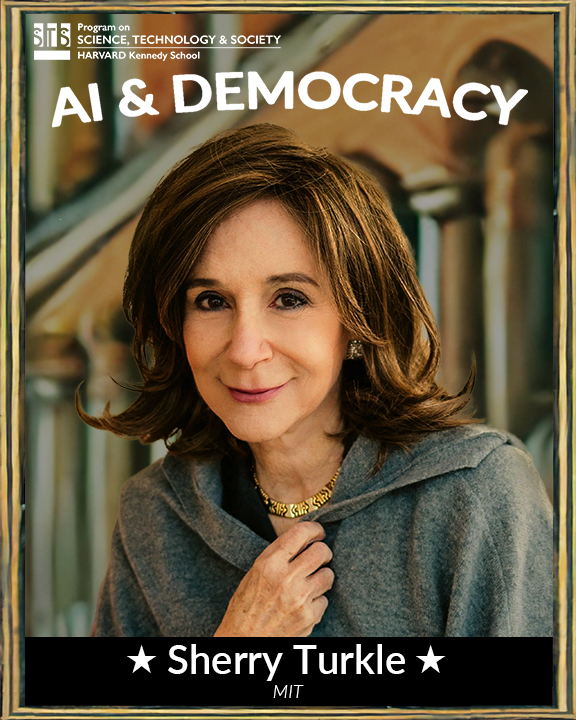 Sherry Turkle is the Abby Rockefeller Mauzé Professor of the Social Studies of Science and Technology in the Program in Science, Technology, and Society at MIT. Professor Turkle received a joint doctorate in sociology and personality psychology from Harvard University and is a licensed clinical psychologist. Professor Turkle writes on the “subjective side” of people’s relationships with technology, especially computers. She is an expert on culture and therapy, mobile technology, social networking, sociable robotics, and generative AI. Her newest book, The Empathy Diaries: A Memoir (Penguin Press, March 2021), ties together her personal story with her groundbreaking research on technology, empathy, and ethics. Her previous book, the New York Times bestseller, Reclaiming Conversation: The Power of Talk in a Digital Age, investigates how a flight from conversation undermines our relationships, creativity, and productivity. Previous works include four other books about evolving relationships in digital culture (Alone Together: Why We Expect More from Technology and Less from Each Other; The Second Self: Computers and the Human Spirit; Life on the Screen: Identity in the Age of the Internet; and Simulation and Its Discontents), and one book about the history of psychoanalysis, Psychoanalytic Politics: Jacques Lacan and Freud’s French Revolution. Turkle has also edited several collections on how we use objects to think with, particularly in the development of ideas about science. These include Evocative Objects: Things We Think With; Falling for Science: Objects in Mind; and The Inner History of Devices. Among other recognition, Professor Turkle has won Guggenheim and Rockefeller Humanities Fellowships, received a Harvard Centennial Medal, and is a fellow of the American Academy of Arts and Sciences. 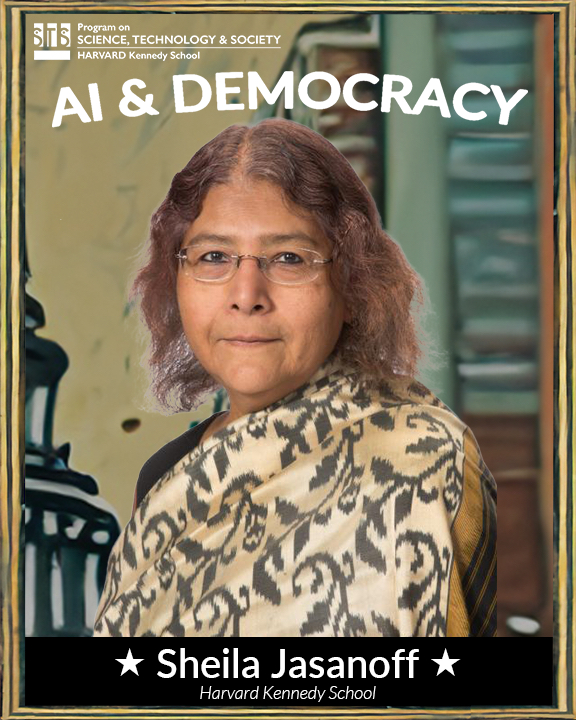 Sheila Jasanoff is Pforzheimer Professor of Science and Technology Studies at the Harvard Kennedy School. A pioneer in her field, she has authored more than 130 articles and chapters and is author or editor of more than 15 books, including The Fifth Branch, Science at the Bar, Designs on Nature, The Ethics of Invention, and Can Science Make Sense of Life? Her work explores the role of science and technology in the law, politics, and policy of modern democracies. She founded and directs the STS Program at Harvard; previously, she was founding chair of the STS Department at Cornell. She has held distinguished visiting appointments at leading universities in Europe, Asia, Australia, and the US. Jasanoff served on the AAAS Board of Directors and as President of the Society for Social Studies of Science. She is a member of the Council on Foreign Relations. Her honors include, most recently, the 2022 Holberg Prize – dubbed the Nobel prize for social science and humanities- for her prolific academic efforts in the field of science and technology studies. She is also the recipient of the SSRC’s Hirschman prize, the Humboldt Foundation’s Reimar-Lüst award, a Guggenheim Fellowship, an Ehrenkreuz from the Government of Austria, and foreign memberships in the British Academy and the Royal Danish Academy. She holds AB, JD, and PhD degrees from Harvard, and honorary doctorates from the Universities of Twente and Liège.  David Kennedy is Manley O. Hudson Professor of Law and Faculty Director of the Institute for Global Law and Policy at Harvard Law School where he teaches international law, international economic policy, legal theory, law and development and European law. He joined the Harvard Law faculty in 1981 and holds a Ph.D. from the Fletcher School at Tufts University and a J.D. from Harvard. He is the author of numerous articles on international law and global governance. His research uses interdisciplinary materials from sociology and social theory, economics and history to explore issues of global governance, development policy and the nature of professional expertise. As a practicing lawyer and consultant, Professor Kennedy has worked on numerous international projects, both commercial and public, including work with PricewaterhouseCoopers with their emerging markets and anti-corruption practice, with the United Nations, the Commission of the European Union, the Qatar Foundation and with the private firm of Cleary, Gottlieb, Steen and Hamilton in Brussels, where his work combined European antitrust litigation, government relations advising and general corporate law. A member of the U.S. Council on Foreign Relations, he is past Chair and Member of the World Economic Forum’s Global Advisory Council on Global Governance. In 2011, he was appointed Foreign Advisor to Thailand’s Truth for Reconciliation Commission and now serves as a member of the Asian Peace and Reconciliation Commission. At Harvard, he served as Chair of the Graduate Committee and Faculty Director of International Legal Studies. He founded the European Law Research Center at Harvard in 1991 and served continuously as its Faculty Director. He has advised a number of educational institutions on their academic programs, and lectured as a Visiting Professor at numerous universities across the world. In 2008-2009, he served as Vice President for International Affairs, University Professor of Law and David and Marianna Fisher University Professor of International Relations at Brown University. ★ Labor and Workers ★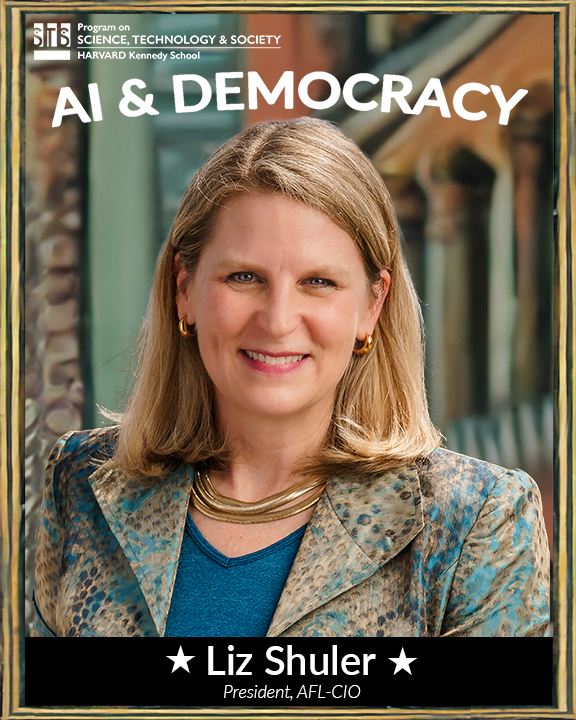 Liz Shuler is president of the AFL-CIO, the democratic federation of 60 national and international unions that represent 12.5 million working people. Shuler is the first woman leader of America’s labor movement. A visionary leader and longtime trade unionist, Shuler believes the labor movement is the single most powerful vehicle for progress and that unions are a central force in leading lasting societal transformations. She is committed to busting myths about labor, leveraging the labor movement’s diversity for innovative approaches to social justice and making the benefits of a union voice on the job available to working people everywhere. 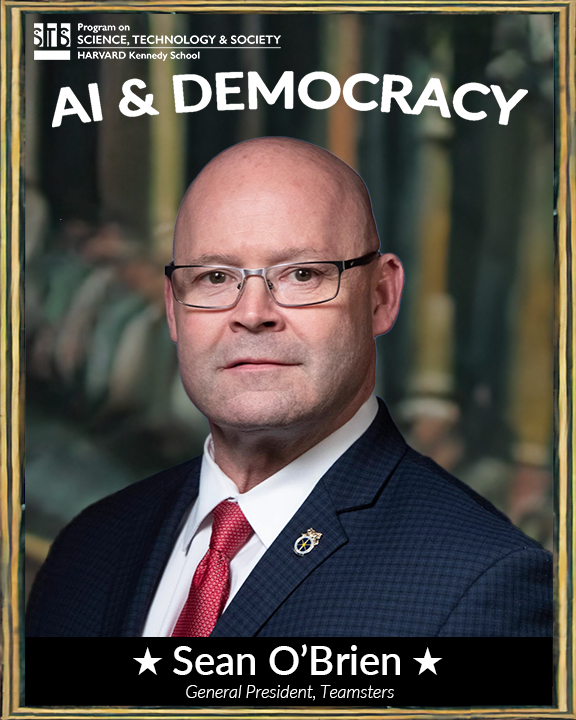 Sean O’Brien is a fourth generation Teamster and the General President of the International Brotherhood of Teamsters. He joined Teamsters Local 25 in Charlestown, Mass. at the age of 18 working in the rigging industry as a heavy-equipment driver in the Greater Boston area. O’Brien became a business agent in 1999 and, in 2006, the youngest President in Local 25’s 128-year history. Under his leadership, Local 25’s membership increased by more than 30 percent. In 2011, he was elected Eastern Region Vice President of the International Brotherhood of Teamsters. O’Brien has worked tirelessly to increase the membership of the Teamsters, both locally and nationally, and has been successful in organizing workers and negotiating strong contracts in a variety of diverse industries. As Teamsters General President, O’Brien is committed to winning and defending strong national contracts, organizing new members, and aggressively taking on employers. O’Brien is focused on mobilizing rank-and-file Teamsters through education and increased engagement—traveling extensively to visit with members at worksites throughout the country. 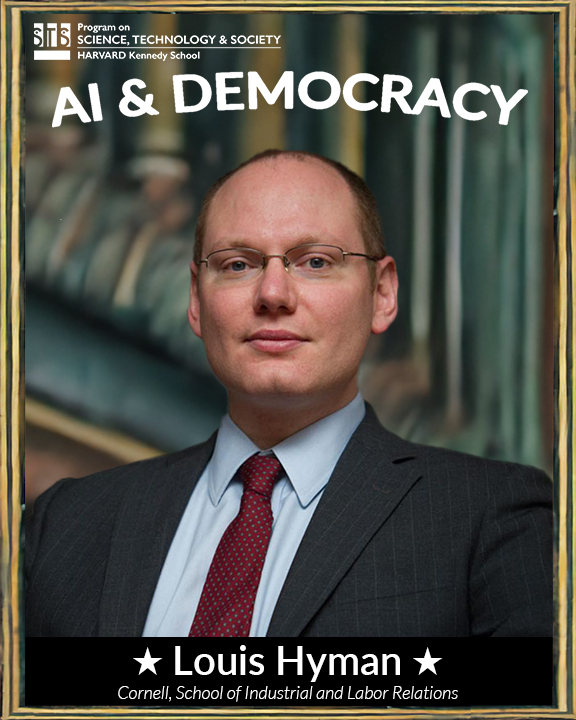 Louis Hyman is a historian of work and business at the ILR School of Cornell University, where he is the Maurice and Hinda Neufeld Founders Professor in Industrial and Labor Relations. He has published two books on the history of personal debt (Debtor Nation and Borrow), a history of how American work became so insecure (Temp), as well as other edited collections and articles. Originally from Baltimore, Hyman received a BA in history and mathematics from Columbia University. A former Fulbright scholar and McKinsey associate, he received his PhD in American history from Harvard University. He is a founding editor of the Columbia Studies in the History of U.S. Capitalism book series from Columbia University Press, and the director of the History of Capitalism Summer Camp. 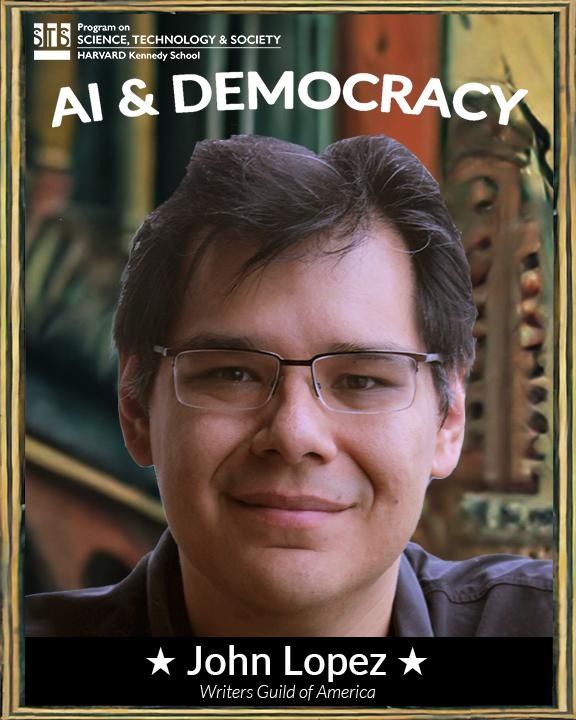 John Lopez is a writer/filmmaker who got his start as an assistant to feature film producers before going on to cover entertainment and the arts for Grantland, Vanity Fair, and The Los Angeles Times, among others. An alum of the Sundance Institute labs, John has subsequently written and produced for such shows as Paramount +’s Strange Angel, Netflix’s Seven Seconds, and Showtime’s The Man Who Fell to Earth. He is a member of the Writers Guild of America (WGA) working group on AI. 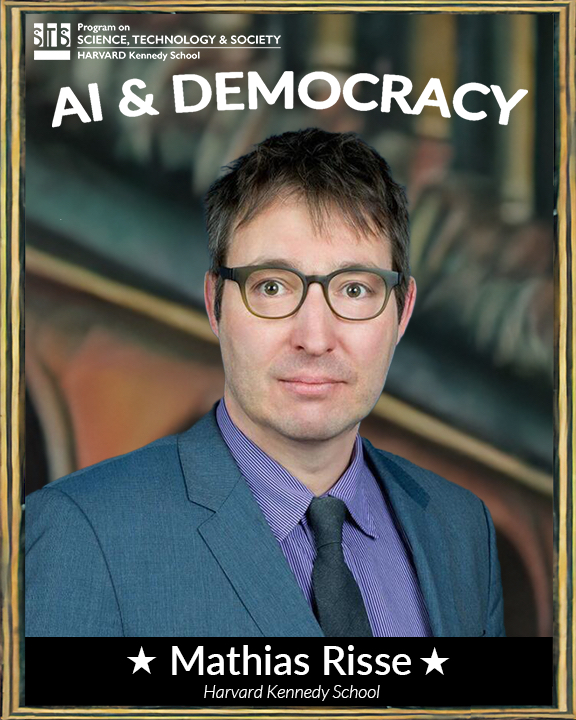 Mathias Risse is the Faculty Director at the Carr Center for Human Rights Policy and the Berthold Beitz Professor in Human Rights, Global Affairs and Philosophy at the Harvard Kennedy School. His work primarily addresses questions of global justice ranging from human rights, inequality, taxation, trade and immigration to climate change, obligations to future generations and the future of technology. He has also worked on questions in ethics, decision theory and 19th century German philosophy, especially Nietzsche. In addition to the Harvard Kennedy School, he teaches in Harvard College and the Harvard Extension School, and he is affiliated with the Harvard philosophy department. He has also been involved with executive education both at Harvard and in collaboration with international organizations. Risse is the author of On Global Justice and Global Political Philosophy and co-author of Holding Together: The Hijacking of Rights in America and How to Reclaim Them for Everyone and On Trade Justice: A Philosophical Plea for a New Global Deal. He also recently published two books with Cambridge University Press; On Justice: Philosophy, History, Foundations (2020), and Political Theory of the Digital Age: Where Artificial Intelligence Might Take Us (2023). ★ Transparency and Democracy ★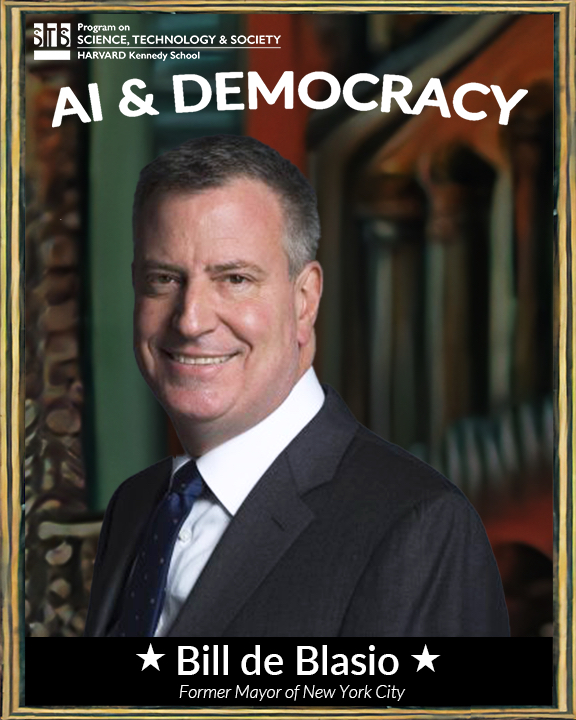 Bill de Blasio is an American political leader who served as the 109th mayor of New York City from 2014 to 2021. A member of the Democratic Party, he held the office of New York City Public Advocate from 2010 to 2013. De Blasio started his career as an elected official on the New York City Council, representing the 39th district in Brooklyn from 2002 to 2009. As mayor, de Blasio led NYC through the Covid-19 pandemic, turning what was once a global epicenter into the safest city in the country. In 2014, de Blasio created a groundbreaking initiative which ensured that early childhood education became a universal right in the five boroughs. The universal Pre-K and 3-K programs in NYC have become a national model. De Blasio graduated from New York University with a B.A. in Metropolitan Studies and from Columbia University with an M.A. in International Affairs. 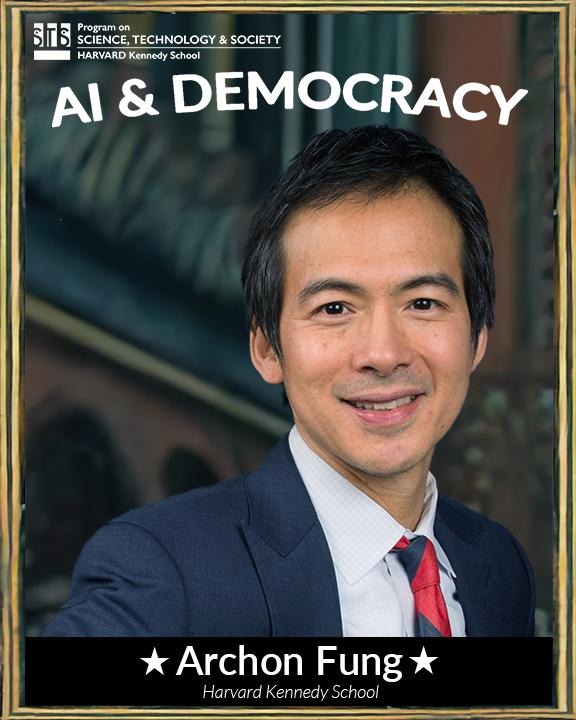 Archon Fung directs the Ash Center for Democratic Governance and Innovation and is the Winthrop Laflin McCormack Professor of Citizenship and Self-Government at the Harvard Kennedy School. He examines policies and practices that aim to deepen democracy, especially through public participation, deliberation, and transparency. His books include Full Disclosure: The Perils and Promise of Transparency and Empowered Participation: Reinventing Urban Democracy. He served as Academic Dean of the Kennedy School from 2014-2018 and was its Acting Dean in 2015. He holds a Ph.D. in Political Science and S.B.s in Physics and Philosophy from the Massachusetts Institute of Technology. 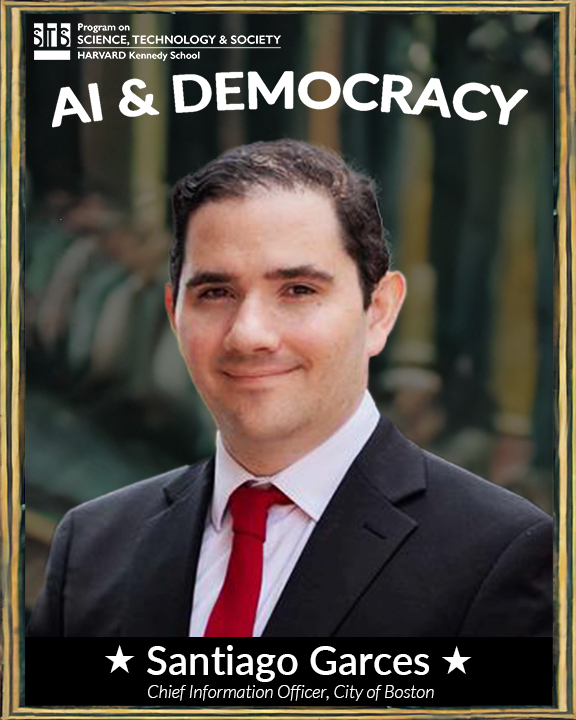 Santiago “Santi” Garces, driven by early experiences in his native Bogotá, Colombia, has dedicated his career to optimizing government efficiency and effectiveness. As the Chief Information Officer (CIO) for the City of Boston, he leads the Department of Innovation and Technology (DoIT), striving to make it an engine of transformation by employing data science and human-centered design. With a robust history in civic tech roles, including pivotal CIO positions in South Bend and Pittsburgh, Santi has won the Bloomberg’s Mayor Innovation project for the Commuter’s Trust and has played an instrumental role in citywide technological advancements. A multilingual and a tech-savvy innovator, Santi has also co-founded a nonprofit, enFocus, aimed at creating innovative solutions for government and industry. His leadership, spanning planning, sustainability, and technological infrastructure, continues to shape the cities he serves towards a more efficient, inclusive, and technologically advanced future. 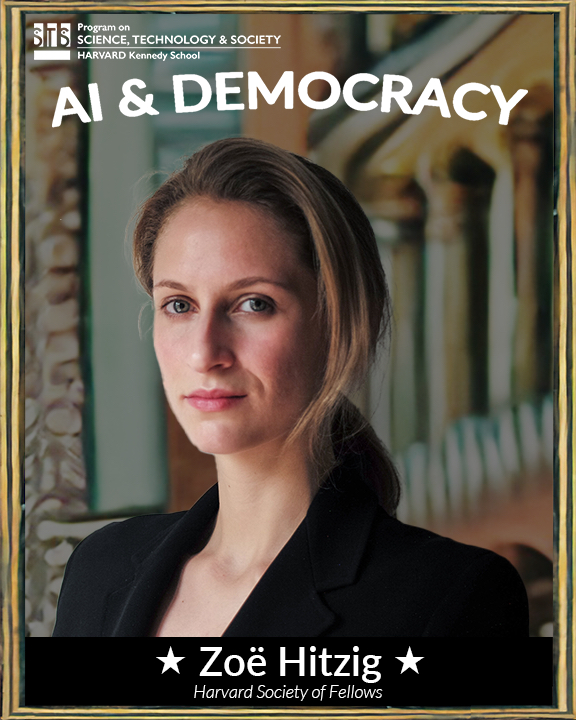 Zoë Hitzig is a Junior Fellow at the Harvard Society of Fellows. Her current research centers on privacy and transparency in markets, contracts and other forms of communication. She received her PhD in economics from Harvard in 2023, and she holds an MPhil in history and philosophy of science from the University of Cambridge.  Jason Jackson is Associate Professor of Political Economy and Urban Planning in the Department of Urban Studies and Planning, and Director of the Political Economy Lab. Jason’s research focuses on the relationship between states and markets, particularly the role of economic ideas and moral beliefs in shaping market institutions. It assesses the implications of political struggles between business, government and societal actors for market structure and resulting competitive and distributional outcomes. Empirically his work focuses on contexts ranging from the politics of monopoly and foreign investment in India from the late colonial period to the present, to the ‘sharing economy’ and urban transportation markets in contemporary cities in Asia, Europe and the United States. Jason completed his Ph.D. in Political Economy at MIT. He also holds an AB in Economics from Princeton University, an MSc in Development Economics from the University of London School of Oriental and African Studies (SOAS) and an MPA from the Harvard Kennedy School. 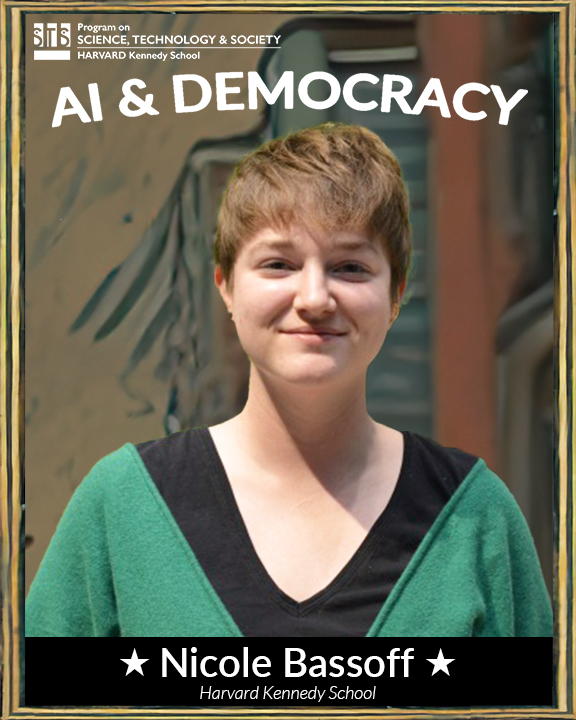 Nicole West Bassoff is a PhD candidate in Public Policy at Harvard Kennedy School, where she is also a Fellow in the Program on Science, Technology and Society. She uses the disciplinary approach of Science and Technology Studies (STS) to examine the ethics and politics of technology-driven urban development projects in the U.S. Through a comparative study of controversies surrounding “smart city” projects, her dissertation interrogates the social compact between cities and citizens in the digital age. She explores how the rights and duties of citizens are reformulated when cities are transformed through private investment and technological innovation. Nicole is interested broadly in the ethics of emerging technologies and has taught for courses ranging from “Philosophy of Technology” to “Bioethics, Law, and the Life Sciences.” She is a co-founder and organizer of the annual Graduate Research in STS (GRiSTS) conference at Harvard. Prior to the PhD, she worked for the Ethics and Governance of AI Initiative at the Berkman Klein Center. Nicole holds an MPhil in History and Philosophy of Science and Medicine from the University of Cambridge and a BA in History and Science from Harvard University. ★ Regulation and Government ★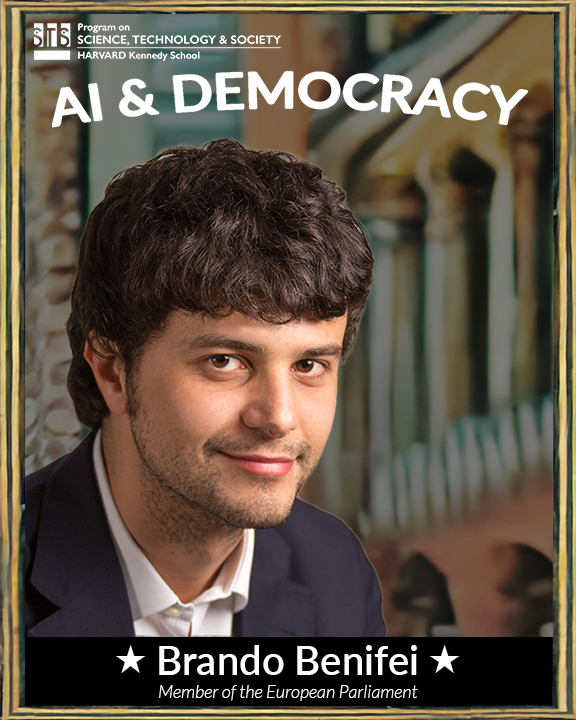 Brando Benifei is a member of the Italian Democratic Party and leader of the party’s delegation in the European Parliament. He is currently in his second five-year term. Brando focuses on a variety of issues in his role, including youth policies related to jobs, welfare, and education; disabled people’s rights; human rights in the Mediterranean and the Middle East; democratic empowerment of Europe’s marginalized communities; federal reform of the European Union; labor rights of online platform workers; combating child poverty; and AI regulation. While in office, he has led efforts to ban unpaid internships in most European institutions and negotiated and obtained the creation of a new Child Guarantee program, financed with EU money to fight child poverty and social exclusion. He is deeply committed to decreasing inequality, expanding freedom, and establishing a truly united and democratic European Federation. 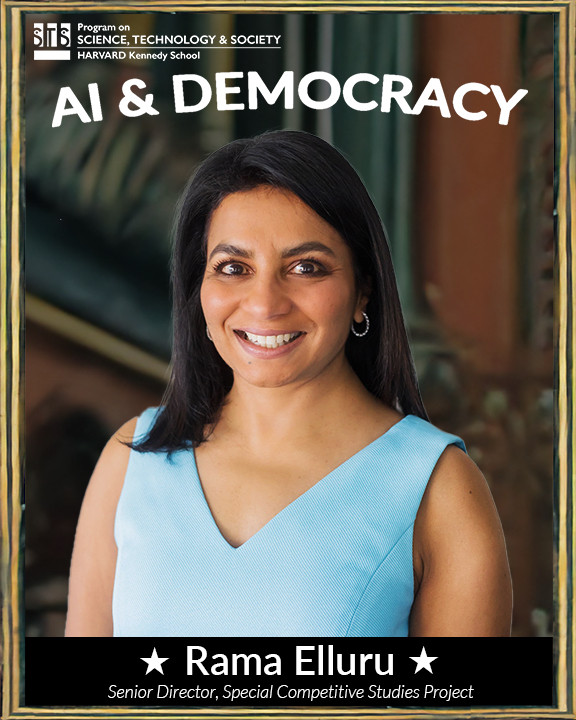 Rama Elluru serves the Special Competitive Studies Project as Senior Director for Society and Intellectual Property, focusing on emerging technology and AI governance. Prior to SCSP, Rama was a Director of Research and Analysis at the National Security Commission on Artificial Intelligence (NSCAI) focused on Responsible AI and Intellectual Property. She was detailed to NSCAI from the United States Patent and Trademark Office, where she served as an Administrative Patent Judge. She has been practicing Intellectual Property law for more than 20 years. She holds a B.S. in Computer Science/Philosophy from Trinity University, J.D. from the Washington and Lee School of Law, and M.Sc. in Biochemistry/Molecular Biology from Georgetown University. 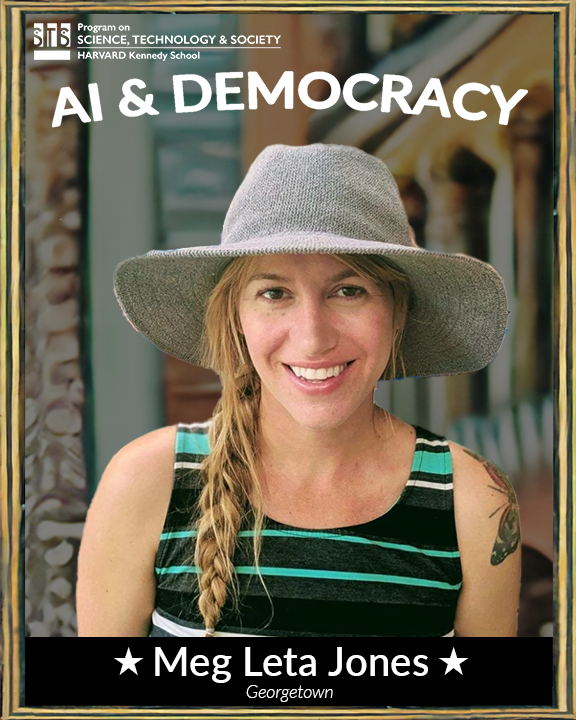 Meg Leta Jones is a Provost’s Distinguished Associate Professor in the Communication, Culture & Technology program at Georgetown University where she researches rules and technological change with a focus on privacy and automation. She’s also a core faculty member of the Science, Technology, and International Affairs program in Georgetown’s School of Foreign Service, a faculty affiliate with the Institute for Technology Law & Policy at Georgetown Law Center, and a faculty fellow at the Georgetown Ethics Lab. Meg’s research covers comparative information and communication technology law, critical information and data studies, governance of emerging technologies, and the legal history of technology. Ctrl+Z: The Right to be Forgotten, Meg’s first book, is about the social, legal, and technical issues surrounding digital oblivion. Her second book project, The Character of Consent: The History of Cookies and Future of Technology Policy, tells the transatlantic history of digital consent through the lens of a familiar technical object. She is also editing a volume with Amanda Levendowski called Feminist Cyberlaw that explores how gender, race, sexuality and disability shape cyberspace and the laws that govern it. 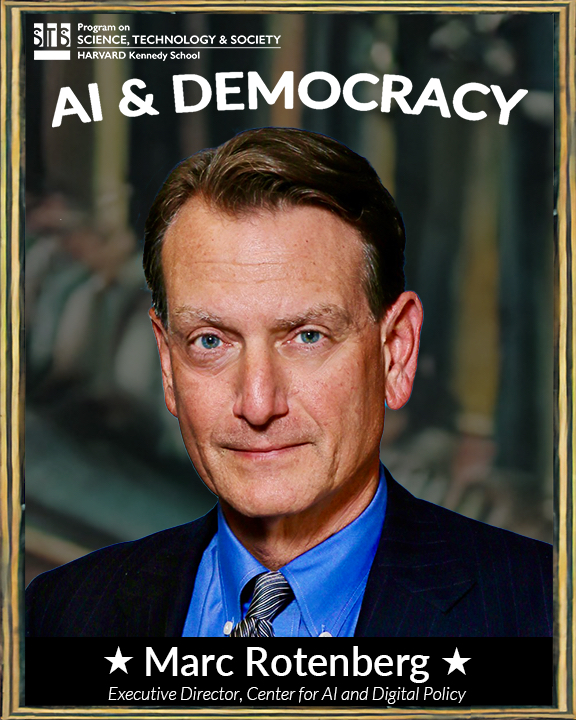 Marc Rotenberg is the founder and executive director of the Center for AI And Digital Policy, a global network of AI policy experts and advocates in more than 80 countries, working to defend democratic values, fundamental rights, and the rule of law. CAIDP trains future AI policy leaders, provides advice to national governments and international organizations, and publishes the AI and Democratic Values Index, a comprehensive review of AI policies and practices around the globe. CAIDP currently has an extensive complaint pending before the Federal Trade Commission regarding OpenAI, CAIDP is also providing expert assistance to the Council of Europe for the first global treaty on AI and working to promote the Universal Guidelines for AI. 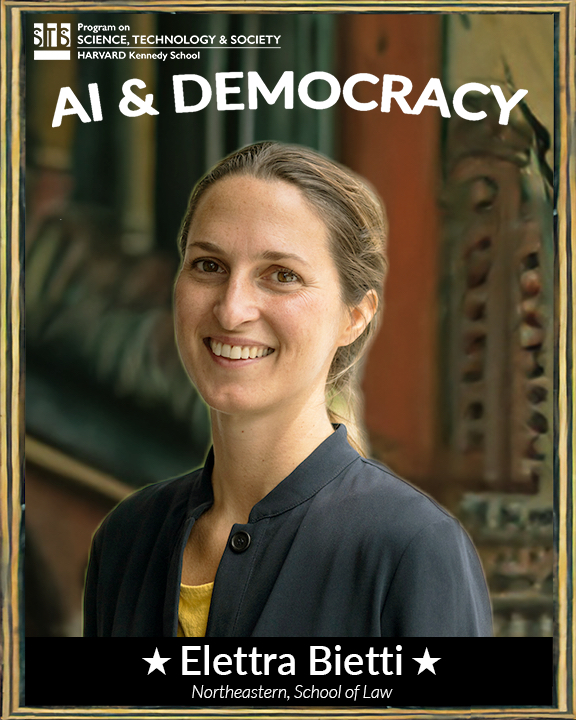 Elettra Bietti is an Assistant Professor of Law and Computer Science at Northeastern University. She is a Faculty Associate at the Berkman Klein Center for Internet and Society at Harvard University and an Affiliated Fellow at Yale Law School’s Information Society Project (ISP). Prior to starting at Northeastern, Elettra was a joint Postdoctoral Fellow at the Information Law Institute at NYU School of Law and at the Digital Life Initiative at Cornell Tech in New York. In 2022, Elettra completed a doctorate at Harvard Law School where she defended a dissertation on the regulation of digital platform companies and data. Her research is on tech law, antitrust and how they overlap in the platform economy. Elettra sometimes advises and collaborates with civil society organizations such as Privacy International. Prior to academia, she was a competition and intellectual property lawyer at Allen & Overy LLP in London and Brussels, handling corporate transactions and patent disputes. ★ Competition and Security ★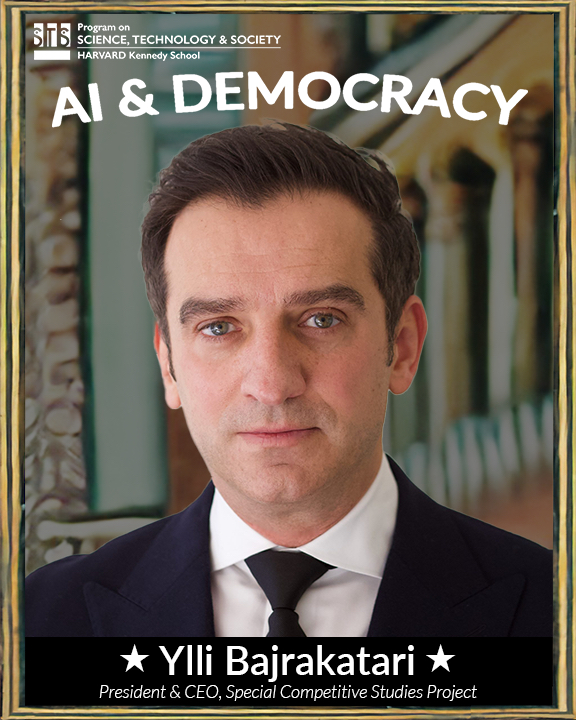 Ylli Bajraktari is the President and CEO of the Special Competitive Studies Project. Prior to launching SCSP, Ylli served as the Executive Director of the National Security Commission on Artificial Intelligence. Prior to joining NSCAI, he served as Chief of Staff to the National Security Advisor LTG H.R. McMaster, held a variety of leadership roles for former Deputy Secretary of Defense Robert Work, and served as Special Assistant to the Chairman of the Joint Chiefs of Staff, General Dempsey. Originally joining the Department of Defense in 2010, he served in the Office of the Undersecretary for Policy as a country director for Afghanistan, and later India. Mr. Bajraktari is the recipient of the Department of Defense Distinguished Civilian Service Medal – the highest award given to career DoD civilian employees. Ylli received his undergraduate degree from The George Washington University and master’s degree from Harvard University. 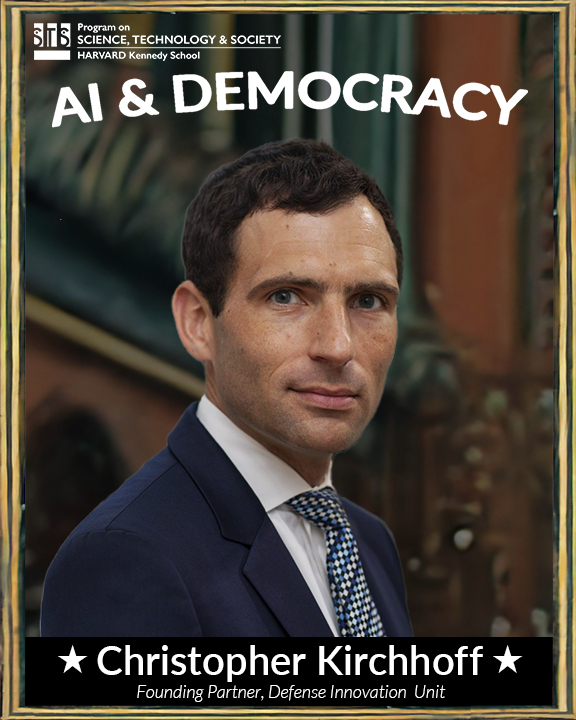 Christopher Kirchhoff is an expert in emerging technology who founded the Pentagon’s Silicon Valley office and has led teams for President Obama, the Chairman of the Joint Chiefs of Staff, and CEO of Google. Most recently Dr. Kirchhoff helped grow the philanthropy of Google CEO Eric Schmidt from 10 to 100 people and $1 billion in programs, working on technology for underserved populations, AI for social good, and the ethics of innovation. Previously he led the 67-person Defense Innovation Unit X, which piloted flying cars and microsatellites in military missions and created a new acquisition pathway for start-ups now responsible for $39 billion dollars of technology acquisition by the Department of Defense. During the Obama Administration, Kirchhoff was Director for Strategic Planning at the National Security Council, the senior civilian aide to the Chairman of the Joint Chiefs of Staff, and an advisor to Presidential Counselor John Podesta. An expert in strategic forecasting, technological systems, and the social impacts of technology, Kirchhoff graduated in History and Science from Harvard College and holds a doctorate in politics from Cambridge University, where he was a Gates Scholar. He has been awarded the Secretary of Defense Medal for Outstanding Service and the Civilian Service Medal for hazardous duty in Iraq. An avid trail runner, Ironman triathlete, and dog dad, from 2011-2014 Kirchhoff was the highest ranking openly gay advisor in the U.S. military. 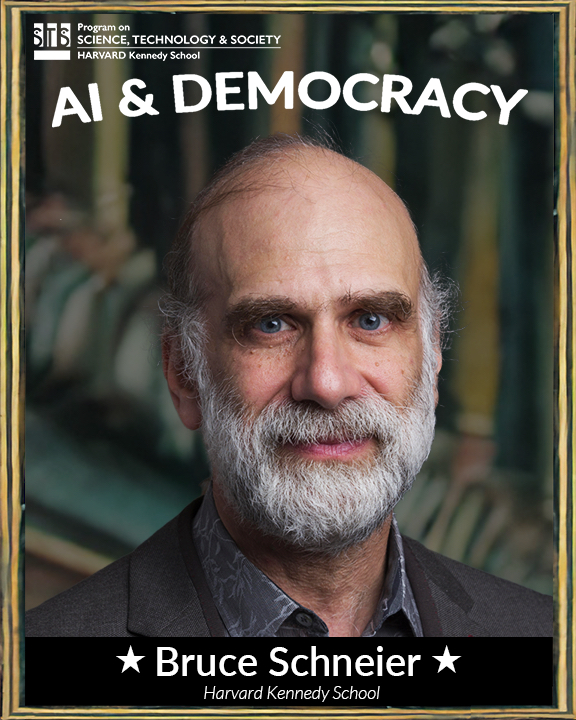 Bruce Schneier is an internationally renowned security technologist, called a “security guru” by the Economist. He is the New York Times best-selling author of 14 books — including A Hacker’s Mind — as well as hundreds of articles, essays, and academic papers. His influential newsletter Crypto-Gram and blog Schneier on Security are read by over 250,000 people. Schneier is a Lecturer in Public Policy at the Harvard Kennedy School, a faculty affiliate at the Ash Center for Democratic Governance and Innovation at HKS, a fellow at the Berkman-Klein Center for Internet and Society at Harvard University, a board member of the Electronic Frontier Foundation and AccessNow, and an advisory board member of EPIC and VerifiedVoting.org. He is the Chief of Security Architecture at Inrupt, Inc. 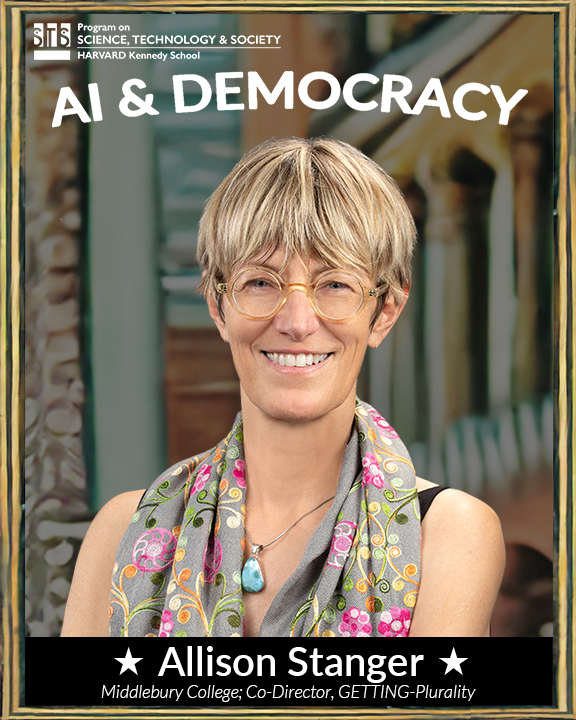 Allison Stanger is Co-Director and Principal Investigator, GETTING-Plurality Research Network, Harvard University; Russell Leng ’60 Professor of International Politics and Economics at Middlebury College; founding member of the Digital Humanism Initiative; and an External Professor and Science Board member at the Santa Fe Institute. Stanger’s next book, Who Elected Big Tech? is under contract with Yale University Press. From November 2023 through January 2024, she will be a visiting scholar at Stanford’s HAI (Human-centered Artificial Intelligence Institute). She received her Ph.D. in Political Science from Harvard University and majored in mathematics as an undergraduate. 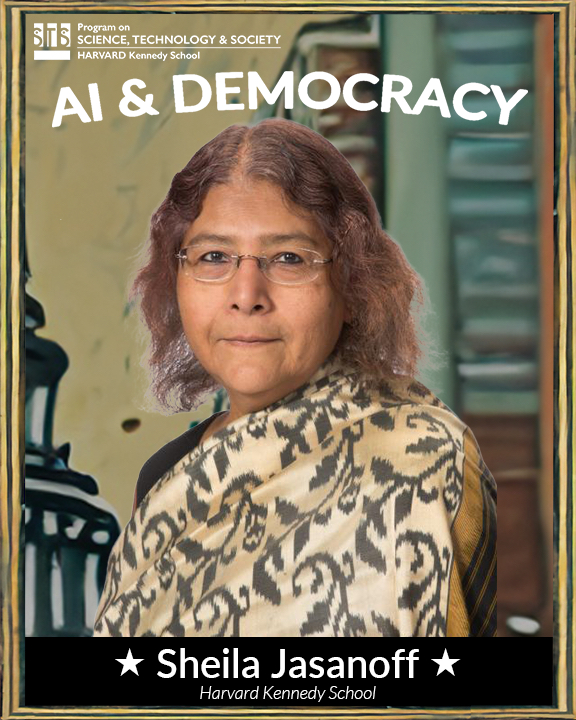 Sheila Jasanoff is Pforzheimer Professor of Science and Technology Studies at the Harvard Kennedy School. A pioneer in her field, she has authored more than 130 articles and chapters and is author or editor of more than 15 books, including The Fifth Branch, Science at the Bar, Designs on Nature, The Ethics of Invention, and Can Science Make Sense of Life? Her work explores the role of science and technology in the law, politics, and policy of modern democracies. She founded and directs the STS Program at Harvard; previously, she was founding chair of the STS Department at Cornell. She has held distinguished visiting appointments at leading universities in Europe, Asia, Australia, and the US. Jasanoff served on the AAAS Board of Directors and as President of the Society for Social Studies of Science. She is a member of the Council on Foreign Relations. Her honors include, most recently, the 2022 Holberg Prize – dubbed the Nobel prize for social science and humanities- for her prolific academic efforts in the field of science and technology studies. She is also the recipient of the SSRC’s Hirschman prize, the Humboldt Foundation’s Reimar-Lüst award, a Guggenheim Fellowship, an Ehrenkreuz from the Government of Austria, and foreign memberships in the British Academy and the Royal Danish Academy. She holds AB, JD, and PhD degrees from Harvard, and honorary doctorates from the Universities of Twente and Liège. ★ Social Movements and NGOs ★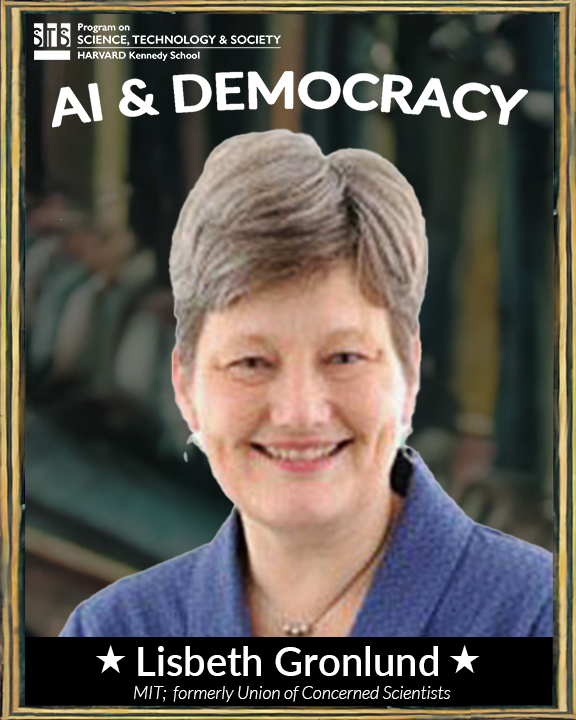 Lisbeth Gronlund holds a Ph.D. in theoretical physics from Cornell University. She has worked on technical and policy issues related to nuclear weapons, missile defenses, and space weapons for over three decades. From 1992 to 2020 she worked at the Union of Concerned Scientists’ Global Security Program, first as a Senior Scientist and, beginning in 2002, as Co-director of the program. Prior to joining UCS, she was a research fellow at the MIT Defense and Arms Control Studies Program and at the Center for International Security Studies at the University of Maryland. Believing that a sound democracy requires independent and well-informed critique of government policy, she has devoted her career to using her scientific background to (1) analyze U.S. nuclear weapons and missile defense programs, counter false government claims, and propose alternative plans; (2) provide information to members of Congress, the public and media; and (3) increase the scientific knowledge base relevant to these issues. She has written about technical and policy issues for both lay and expert readers and given talks about these issues to both lay and expert audiences. Lisbeth helped establish and was a primary organizer of the International Summer Symposiums on Science and World Affairs, which each year from 1989 through 2019 brought together around 40 young scientists from around the world to learn how to apply their expertise to nuclear weapons policy and related security issues. These meetings helped foster a new generation of independent scientists with expertise on security issues. Lisbeth is a fellow of the American Association for the Advancement of Science and the American Physics Society (APS). She is the co-recipient of the 2001 Joseph A. Burton Forum Award of the APS “for creative and sustained leadership in building an international arms-control-physics community and for her excellence in arms control physics.” David Hogg 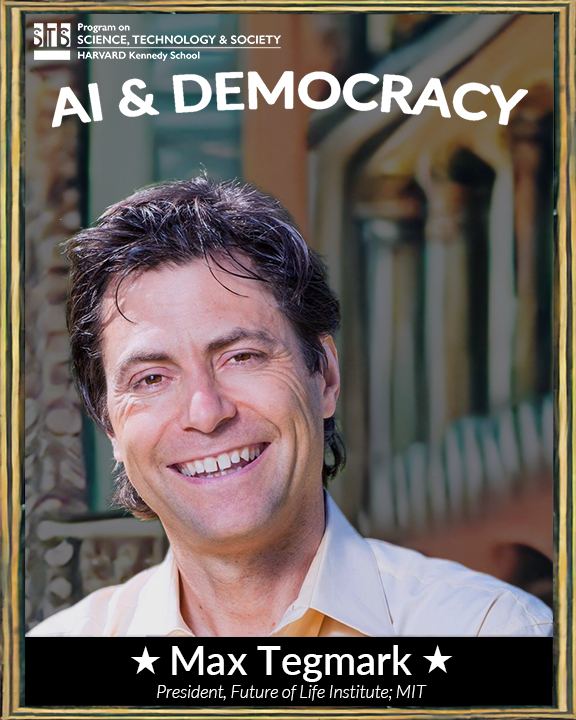 Max Tegmark is a professor doing AI and physics research at MIT as part of the Institute for Artificial Intelligence & Fundamental Interactions and the Center for Brains, Minds and Machines. He advocates for positive use of technology as president of the Future of Life Institute. He is the author of over 300 publications as well as the New York Times bestsellers “Life 3.0: Being Human in the Age of Artificial Intelligence” and “Our Mathematical Universe: My Quest for the Ultimate Nature of Reality”. His most recent AI research focuses on mechanistic interpretability as well as news bias detection with machine-learning. 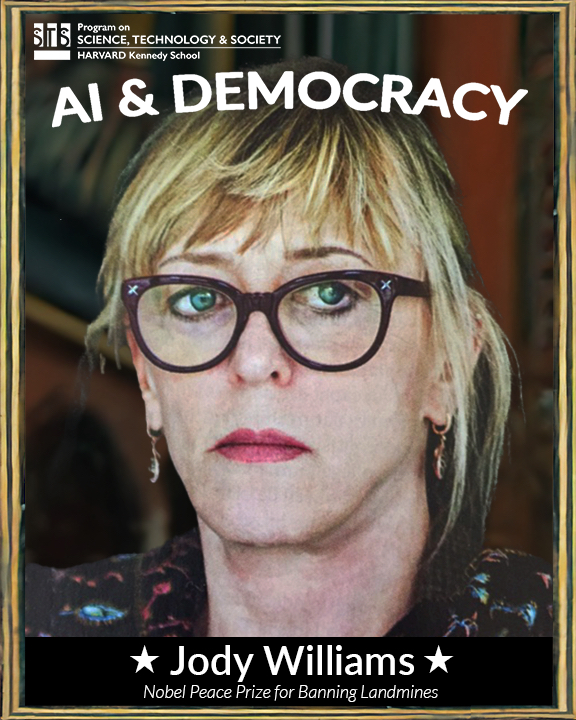 Jody Williams is a direct and outspoken American political activist who is passionate about disarmament, human security, human rights and protecting all life on this planet in order to create sustainable peace with justice and equality in our world. In 1992, she began her work to help create a global campaign to ban landmines. Williams received the Nobel Peace Prize in 1997. For Williams, disarmament is fundamental for the possibility of achieving enduring peace. In 2013, she cofounded the Campaign to Stop Killer Robots. The campaign is a global effort to prohibit the marriage of artificial intelligence and weapons of war to create autonomous weapons systems that on their own and without human intervention can target and kill human beings. She was the founding chair of the Nobel Women’s Initiative, which began its work with seven women recipients of the Nobel Peace Prize in January of 2006. Through the prestige of the Peace Prize and the influence and access of the women Nobel Laureates, the Initiative works to support and amplify the efforts of grassroots women’s organizations working for peace with justice in areas of conflict around the world. 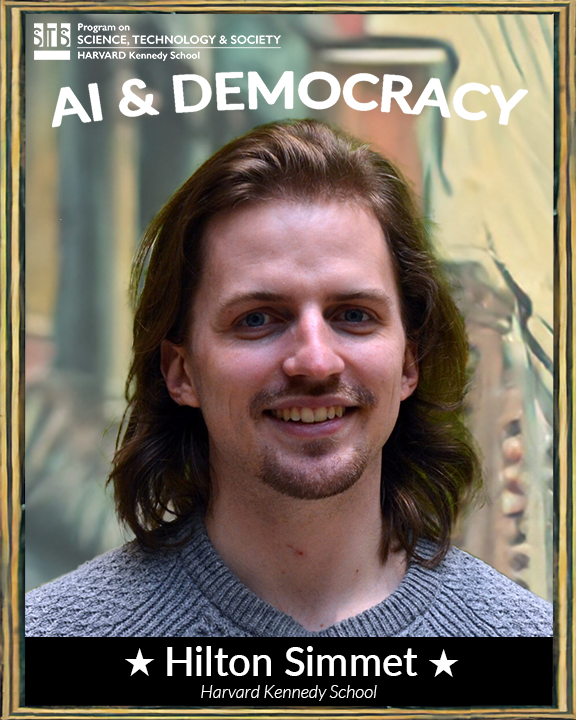 Hilton Simmet is a Ph.D. candidate in Public Policy and a Research Associate with the Program on Science, Technology and Society at Harvard Kennedy School. His research centers on the relationship between political theory and public policy, with a particular focus on how research paradigms seeking to address inequality reflect underlying ideas of political order, namely the welfare state. In particular, his dissertation work asks how distinct social science methods—randomized controlled trials (RCTs), historical data collection and action-oriented research—emerged from unique political contexts in the US, France and India. Through this research he is trying to understand how the science of inequality is intimately tied up with political efforts to achieve social justice—or, put differently, how societies co-produce epistemic and normative orders to achieve important policy aims such as combatting poverty or reducing inequality. Hilton holds an A.B. in Social Studies from Harvard College and an M.A. in Political Science from Yale University. ★ Special Guests ★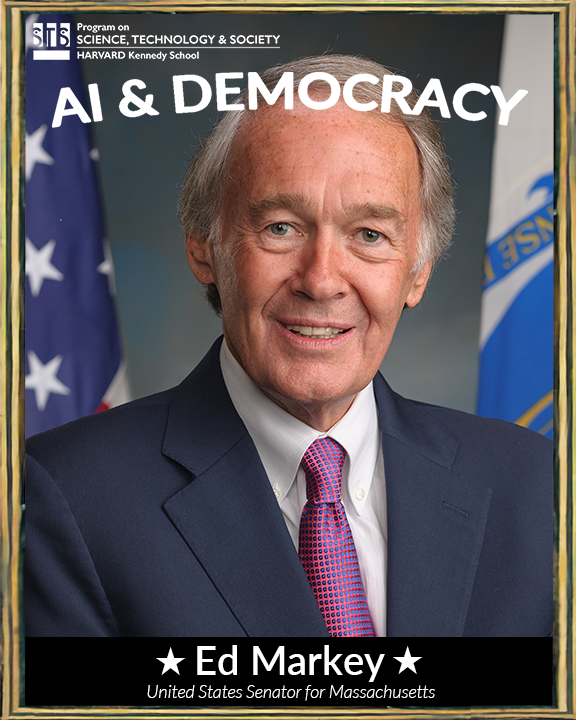 Senator Ed Markey has served the Commonwealth of Massachusetts as a Congressman and U.S. Senator for more than 40 years. He has been a national leader and author of some of the most important laws in the areas of energy, the environment, and telecommunications policy. On a bipartisan basis, he has passed more than 500 pieces of legislation into law. He has been a powerful and effective voice for enhancing energy efficiency, transitioning our economy to clean and sustainable energy resources and mitigating the consequences of climate change; bolstering U.S. and global security by staunching nuclear proliferation and promoting arms control; defending human rights; enacting financial reforms to protect consumers and investors against the types of abuses that directly triggered the global recession; ensuring the continued openness of the internet; and advancing the interests of consumers by injecting competitiveness into electric, telecommunications and telephone markets, and protecting the privacy of personal information. Senator Markey currently serves as Chair of the Clean Air, Climate and Nuclear Safety Subcommittee on the Senate Environment and Public Works Committee, as well as the Chair of the Primary Health and Retirement Security Subcommittee on the Health, Education, Labor and Pensions Committee. He is also a member of the Commerce, Science, and Transportation Committee and the Small Business Committee. Senator Markey received his B.A. from Boston College and his J.D. from Boston College Law School. He served in the U.S. Army Reserve and two terms in the Massachusetts State House before being elected to Congress. 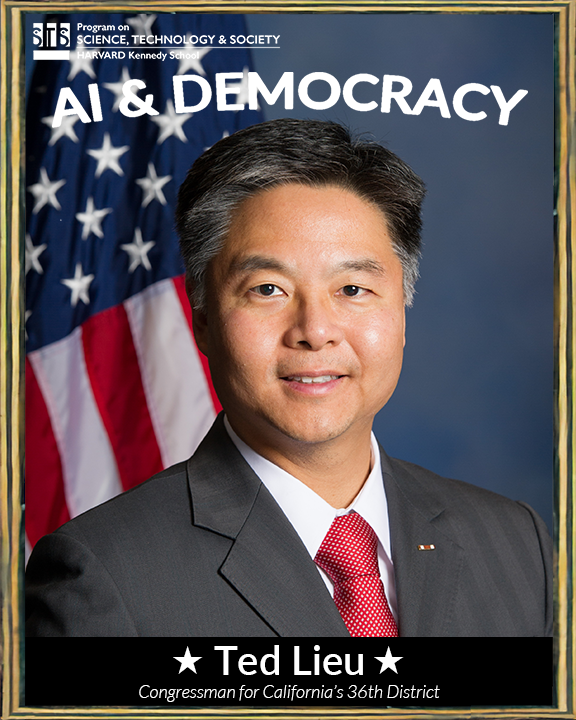 Congressman Ted Lieu represents California’s 36th Congressional District in the United States House of Representatives. Ted is serving in his fifth term in Congress and sits on the House Judiciary Committee; Foreign Affairs Committee; and Science, Space, and Technology Committee. He was elected by his colleagues to serve as Vice Chair of the Democratic Caucus, making him the highest ranking Asian American to have ever served in House Leadership. Ted is a veteran, having served on active duty and then in the Reserves for the Air Force. He retired in 2021 with the rank of Colonel.  Carol Rose is executive director of the ACLU of Massachusetts. A lawyer and journalist, Carol has spent her career advocating for human rights and civil liberties both in the United States and abroad, including Afghanistan, Pakistan, Nepal, Japan, Sri Lanka, Israel, the West Bank and Gaza, Northern Ireland, and Vietnam. Prior to assuming her position at the helm of the ACLU of Massachusetts in January 2003, she worked as an attorney at the Boston law firm of Hill & Barlow, where she specialized in First Amendment and media law, intellectual property, civil rights, and international human rights law. She clerked for U.S. District Court Judge Patti Saris. She holds degrees from Stanford University, the London School of Economics, and Harvard Law School. 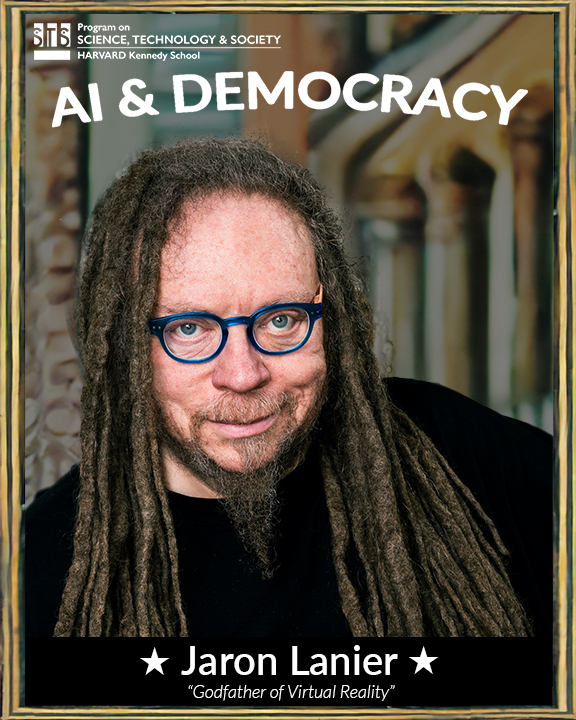 Jaron Lanier is a computer scientist, composer, and visual artist. He is the author of You Are Not A Gadget: A Manifesto; and Who Owns The Future? His scientific interests include biomimetic information architectures, user interfaces, heterogeneous scientific simulations, advanced information systems for medicine, and computational approaches to the fundamentals of physics. Lanier’s name is also often associated with Virtual Reality research. He either coined or popularized the term ‘Virtual Reality’ and in the early 1980s founded VPL Research, the first company to sell VR products. Sun Microsystems acquired VPL’s seminal portfolio of patents related to Virtual Reality and networked 3D graphics in 1999. From 1997 to 2001, Lanier was the Chief Scientist of Advanced Network and Services, which contained the Engineering Office of Internet2, and served as the Lead Scientist of the National Tele-immersion Initiative, a coalition of research universities studying advanced applications for Internet2. The Initiative demonstrated the first prototypes of tele-immersion in 2000 after a three-year development period. From 2001 to 2004 he was Visiting Scientist at Silicon Graphics Inc., where he developed solutions to core problems in telepresence and tele-immersion. He was Scholar at Large for Microsoft from 2006 to 2009, and Partner Architect there from 2009 forward. Lanier received an honorary doctorate from New Jersey Institute of Technology in 2006, was the recipient of CMU’s Watson award in 2001, was a finalist for the first Edge of Computation Award in 2005, and received a Lifetime Career Award from the IEEE in 2009 for contributions to Virtual Reality. |
||||||